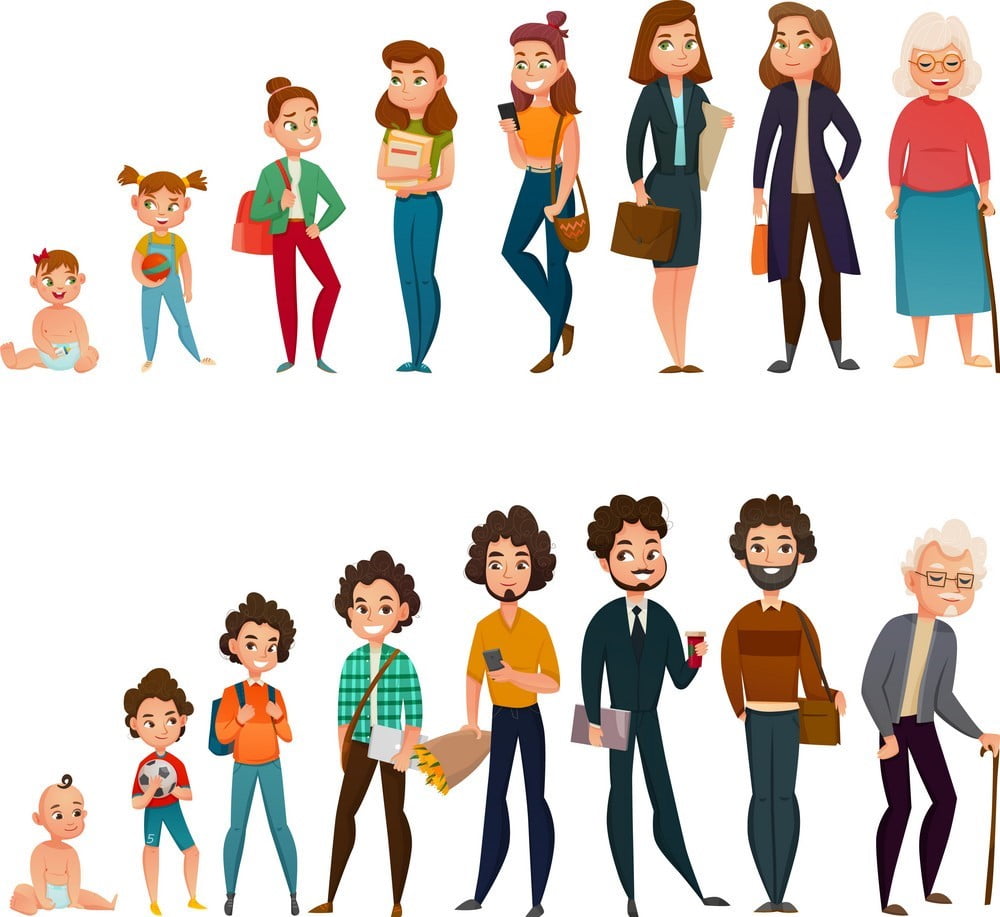The Human Life Cycle

People are vulnerable to experiencing different mental stressors at certain stages in life depicted on the Human Life Cycle above. This may relate to transitioning from one stage of life to another or major changes which impose extra stress on you. It is always difficult to accept and adjust to the new and your mental health is at risk whenever change happens depending on which life stage you are. People react differently to changes like moving to another school, starting or finishing university, starting a new job, adjusting to chronic illness, moving away from friends or family and retirement. This can have a severe impact on the general health and well-being of an individual hence the need for support and information on how to cope. There is no single “right way” to react or handle change as some of may be deeply affected by events than others. Everyone is different.
Our genes, life experiences, upbringing and environment all affect our mental health and influence how we think and respond to situations. It can also depend on how well other parts of our life are going or how supported we feel. Being aware of these factors may make it easier to understand when we or someone we care about are struggling.
Common Mental Stressors by Stage in Life
Pregnancy to becoming a new parent
This stage can as well include postnatal depression. Becoming a parent can be exciting but also very challenging and physically demanding. Research has revealed that a majority of new mothers feel that they are at breaking point. Commonly experienced issues include anxiety (36%) and post-natal depression (12%). Nearly two-thirds (63%) of new mums asked said that their self-esteem had decreased since becoming a parent, while fewer than one in 10 (9%) felt more confident following the birth of their child.
Childhood years – starting schools, changing schools and the move to high school
The beginning of school is a time of transition for both parents and children. Children enter a completely new environment, the school where they encounter a different set of expectations to their home life. They have to learn a whole new set of social skills, such as how to get along with others and how to be resilient when they don’t get what they want. In younger kids, psychological distress might manifest as new or worsening behavioral problems, difficulty separating from parents or caregivers, or somatic symptoms such as aches and pains or changes in sleep routines or appetite. Older kids can also experience somatic symptoms as well as fear, nervousness, stress, irritability, and hypervigilance. In the academic context, symptoms could include difficulty concentrating, motivation, or school refusal.
Teenage years
Transitioning from primary to high school is another big step, with a new environment and a new set of expectations. In your teenage years you experience a range of emotions. Events such as new relationships, studying for exams, starting a new job and figuring out your friendship group can be challenging. During this time, following puberty, the brain is also going through a critical time of development which affects emotions, decision making, controlling impulses, anticipating consequences of behaviour and the ability to take-in information and understand it, then set goals and plan.
Adults (18 to 65 years)
Growing up can often be a struggle for many adolescents who view adulthood with apprehension rather than excitement to explore. It is no wonder many young adults often develop depression, anxiety, eating disorders, substance abuse disorders, and have difficulty meeting developmental milestones. Moving into the adult world can bring its own set of stresses such as; deciding what you want to do after leaving school, whether to pursue tertiary education, what to study or search for a job. Negotiating the adult world with new freedoms and responsibilities can be challenging. Similarly, developing relationships, starting a family, getting married and long hours of work, finding a job, romantic relationships, social media all bring stresses that can affect your mental health.
Older adults (over 65 years) and retirement
Growing older brings its share of challenges. At this stage in life you may find it difficult to look after your mental health and well-being at times. If feelings like sadness or worry are preventing you from getting the most out of life, help and support is available for seniors with mental health issues. These effects include partial identity disruption, decision paralysis, diminished self-trust, experience of a post retirement void, the search for meaningful engagement in society, development of a retirement/life structure, the confluence of aging and retirement and death anxiety, etc.
Major life events
Everybody experiences ups and downs in life. These could be due to the stress brought about by major events that occur in life such as: financial worries, job loss, a death, an accident or long-term injury and breakdown of a relationship etc. Sometimes even happy events like the birth of a new baby in the family, moving interstate or overseas, planning a wedding or retirement can be stressful and result in you feeling down. Always remember to talk to a professional psychologist whenever you encounter these issues.
“Healing takes time, and asking for help is a courageous step.” – Mariska Hargitay


2 comments
Thank you for your sharing. I am worried that I lack creative ideas. It is your article that makes me full of hope. Thank you. But, I have a question, can you help me?
yes you can email me at tmasara@mentalbalanceseries.com